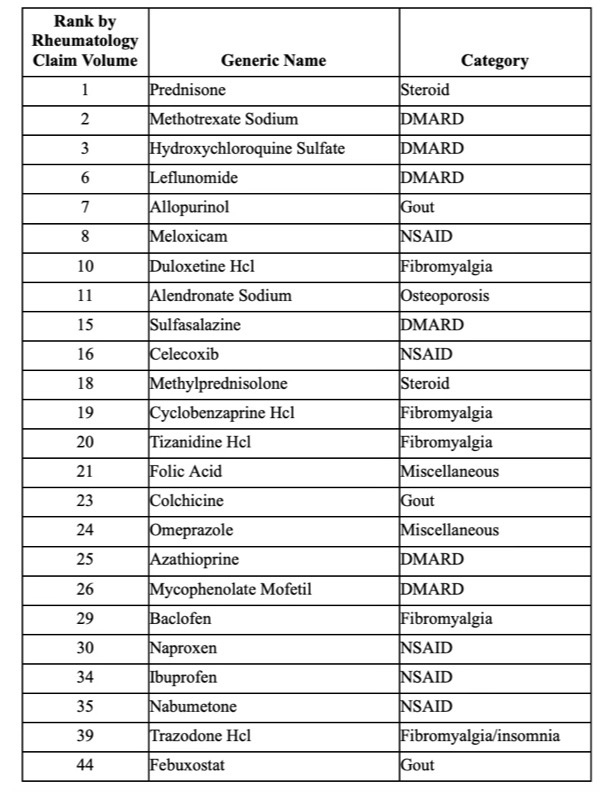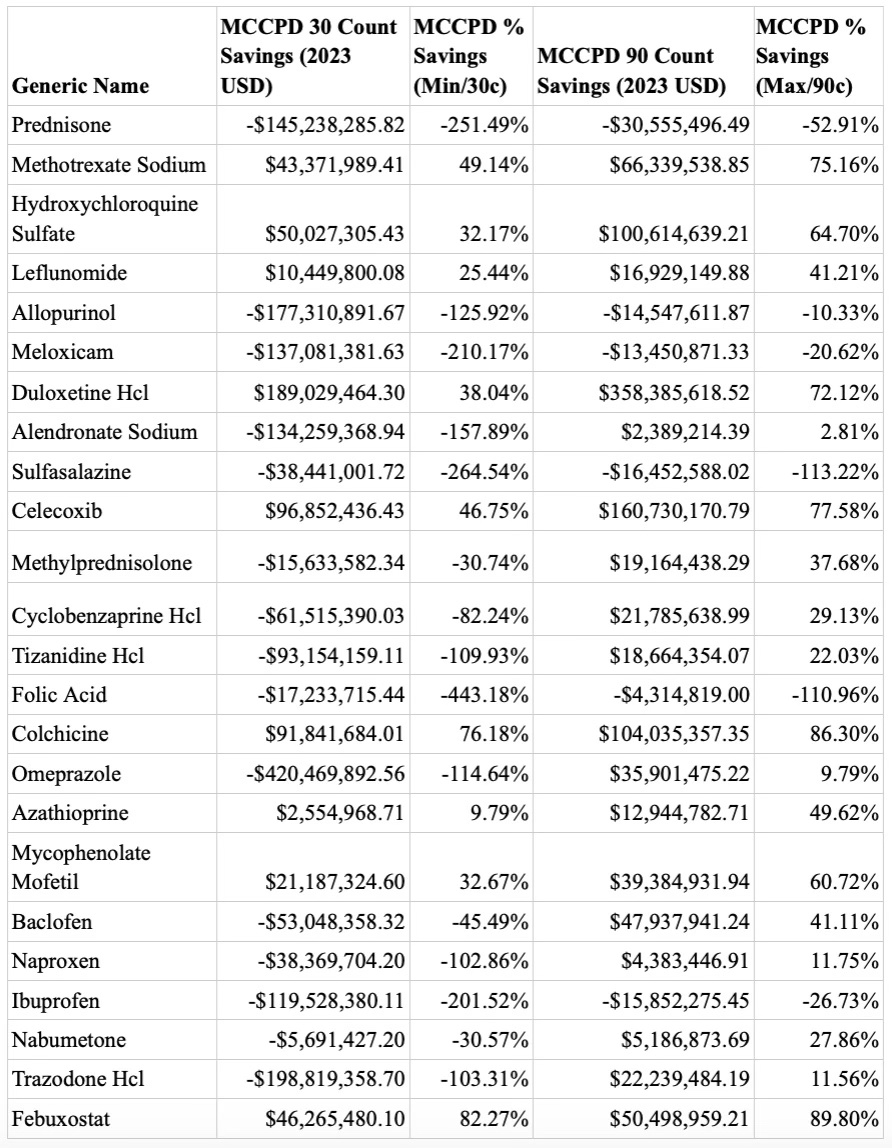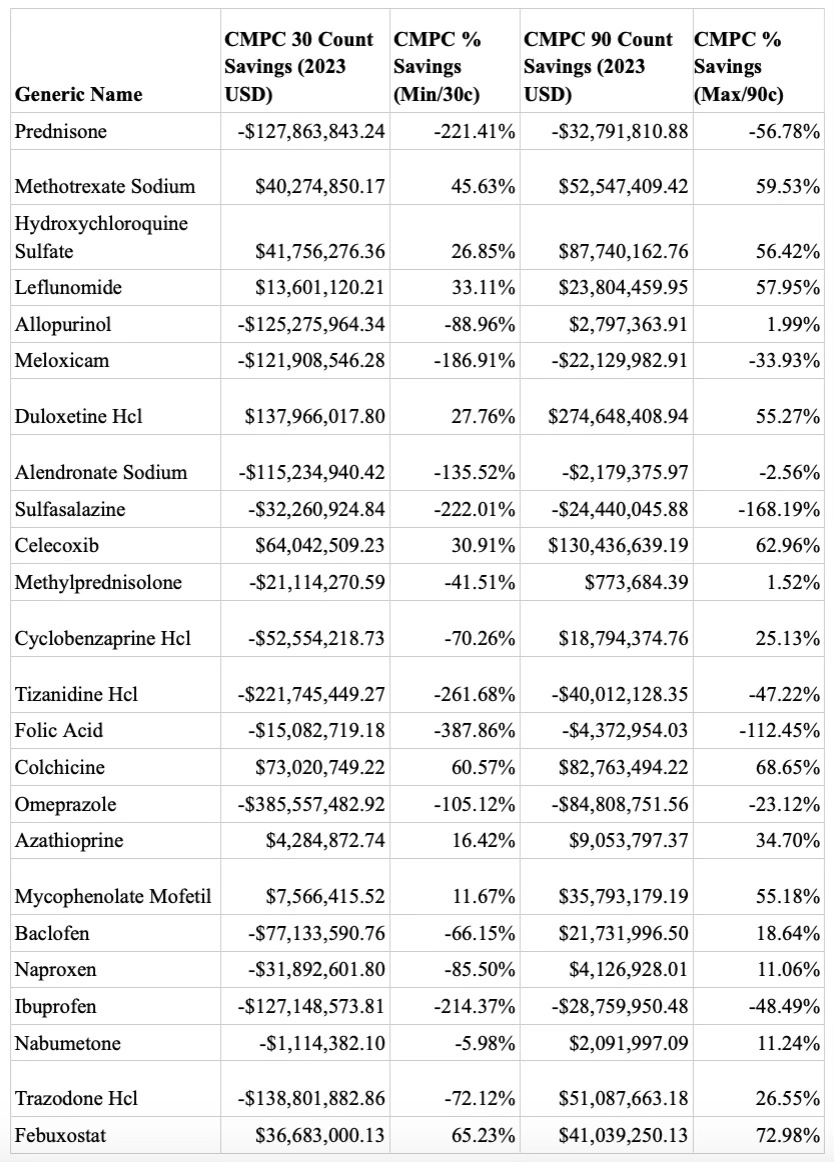Session Information
Session Type: Poster Session B
Session Time: 10:30AM-12:30PM
Background/Purpose: Recent policy changes and competitive alternative drug pricing models present the potential for medication cost savings. In this study, we sought to assess the cost differences between alternative drug sourcing models, such as Mark Cuban Cost Plus Drugs (MCCPD) and Costco Membership Prescription Company (CMPC), compared to Medicare Part D purchasing on medications frequently prescribed by rheumatologists.
Methods: We assessed the drug costs of 24 commonly prescribed rheumatologic medications across MCCPD, CMPC, and Medicare Part D provider drug claims. Medications within Table 1 were identified by Part D Provider and Drug rheumatology claim volume and simultaneous availability on MCCPD and CMPC as of January 2024. We included those in tablet or capsule form, excluding injectable medications due to the lack of exact dose units. When multiple dosage options were available for the same medication, we selected the dose most utilized in clinical practice. We extracted total spending, unit price, and units (tablets/capsules) dispensed from 2022 Medicare Part D Spending by Drug data. Total spending was adjusted to reflect changes in costs from 2022-2023 using Medicaid’s National Average Drug Acquisition Cost (NADAC) database. We extracted the cost-per-pill for each medication from Medicare Part D data and compared this with the cost-per-pill for MCCPD and CMPC at both maximum (90-count) and minimum (30-count) supply volume.
Results: With MCCPD 30-count supply purchasing, 37.5% (n=9/24) of drugs showed a savings (net of $552 million, rounded to the nearest million) with an average savings of 43.6% when compared to Medicare spending on the same drugs. Purchasing through the MCCPD 90-count supply model resulted in savings of $1.09 billion across 18/24 drugs, with an average savings of 45.1%. In the CMPC 30-count supply model, there was a net savings of $418 million across 9/24 drugs, with an average savings of 35.4%. The CMPC 90-count supply model showed a net savings of $839 million across 16/24 drugs, with an average percent savings of 38.7%. Savings (+) or losses (-) for each individual drug are displayed in Table 2 and Table 3. Table 1 displays each drug ranked by claim volume and their respective drug category.
Conclusion: In this study, we demonstrated that medication purchasing through MCCPD and CMPC conferred significant potential savings on many common rheumatologic drugs when compared to Medicare Part D spending. Drugs in the 90-count, or maximum supply model, were generally more cost effective than in the 30-count model, though both categories demonstrated price points on particular drugs that were competitive with or exceeding that of Medicare. Alternative drug sourcing may play a role in both alleviating healthcare spending and navigating economic barriers to care. Awareness of specific drugs with cost-effective availability via these competitive models may assist in relieving patient and physician concerns about medication costs.
Disclosures: K. Schoeffler: None; S. Beveridge: None; M. Bouvette: None; V. Kurra: None; R. Moussa: None; R. Johnson: None; C. Goerend: None; N. Bader: None; R. Nipp: None.
To cite this abstract in AMA style:
Schoeffler K, Beveridge S, Bouvette M, Kurra V, Moussa R, Johnson R, Goerend C, Bader N, Nipp R. Shifting Paradigms in Drug Spending: A Study of Medicare Part D versus Emerging Pharmacy Models in Rheumatology [abstract]. Arthritis Rheumatol. 2024; 76 (suppl 9). https://acrabstracts.org/abstract/shifting-paradigms-in-drug-spending-a-study-of-medicare-part-d-versus-emerging-pharmacy-models-in-rheumatology/. Accessed .« Back to ACR Convergence 2024
ACR Meeting Abstracts - https://acrabstracts.org/abstract/shifting-paradigms-in-drug-spending-a-study-of-medicare-part-d-versus-emerging-pharmacy-models-in-rheumatology/



